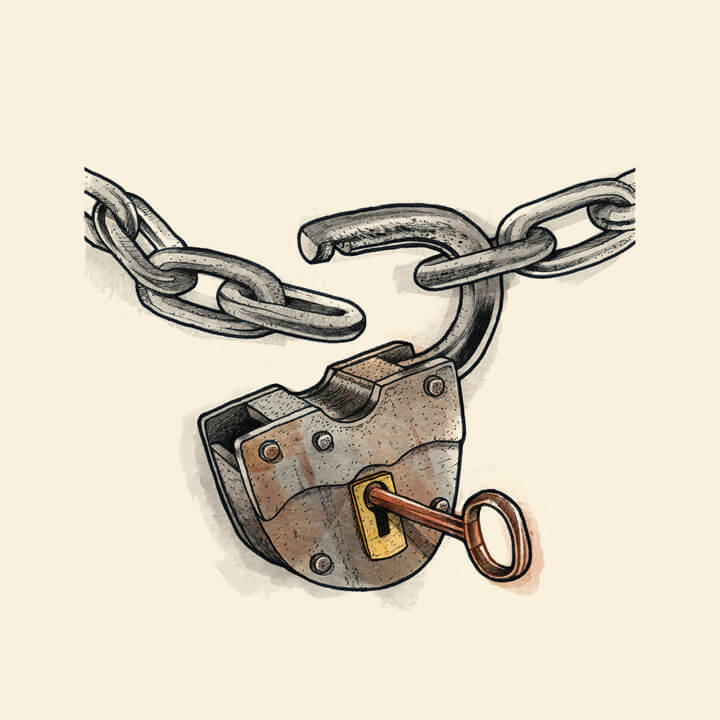It’s not uncommon for people to feel trapped in life—as if held back and dragged down by invisible chains. Whatever they do, they can’t escape pain and confusion. The Bible has a name for this: sin. It’s a kind of spiritual prison for which there’s no “get out of jail free” card. Yet there is a path to freedom—and though it’ll cost everything you’ve relied on for so long, you will gain nothing less than heaven in return.

READ
Acts 16:22-34
BACKGROUND
When Paul and Silas were arrested for preaching the gospel, the Philippian prison warden took precautions to make sure they didn’t escape.
REFLECT
Many people want to lead “good” lives. But how is this possible?
-
Paul and Silas’s jailer was told to “guard them securely” (Acts 16:23). Acts 16:24 says he “received” this command, throwing them into a dungeon and painfully restraining them. According to Strong’s Concordance, the Greek word used for “receive”—lambanó—can mean “take” or “lay hold of.” Another source renders it “lay hold by aggressively accepting … [emphasizing the] assertiveness of the receiver.” What does this tell you about the jailer’s desires and state of mind? What words might describe the strengths of his character?
-
Cultures the world over have values they strive to live by, whatever the dominant religion. This includes secular societies, which usually have some code of virtue that is more or less prized. In fact, even before placing faith in Jesus, many people have a desire to do what’s right, at least in principle. But two important questions deserve consideration: What is right? And how can we achieve it? Can you describe a time you have wrestled with these questions? Have you ever been wrong in your answers?
CONTINUING THE STORY
Whether it’s loud and violent, or quiet and hardly noticed, God’s work in our heart is a radical overthrow of the old self. Through rebirth, He creates something—someone—completely different and then commences the lifelong process of conforming the believer to the image of Christ.
Whether it’s loud and violent, or quiet and hardly noticed, God’s work in our heart is a radical overthrow of the old self.
-
As Paul and Silas were singing and praising God in the darkness, a miraculous earthquake shook the prison. No one was killed, but the cell doors were thrown open and everyone’s chains unfastened (Acts 16:25-26). This disaster led to the jailer’s conversion to belief in Jesus Christ and his eternal salvation. Consider your own call to faith. Was there an “earthquake moment”? Or was it more like a quiet shift? How does pondering God’s involvement in your life increase your joy?
-
Reread Acts 16:27-30. What do you think was happening to the jailer in Acts 16:29?
-
After Paul and Silas explained the gospel to him, the jailer was baptized into the faith (Acts 16:32-33). Scripture says, “All of us who have been baptized into Christ Jesus have been baptized into His death” (Rom. 6:3). What do you think it means to be baptized into Jesus’ death—in other words, what would you say died with Him on the cross? How does your answer relate to 1 Peter 2:24: “He Himself bore our sins in His body on the cross, so that we might die to sin and live to righteousness”?
REFLECT
Consider how the jailer’s life became different.
-
God promises that those who believe on Jesus will be forever changed (2 Corinthians 5:17). What does Acts 16:33-34 tell you about the “new things” that come to those in Christ? Describe the jailer’s character in this passage.
-
Even noble intentions can lead us astray, but a heart reborn in Christ has the potential to act on the knowledge of what is right.
GOING FURTHER
Consider how this study applies to your life.
Most transformations require some getting used to. Just as a newly emerged butterfly must painstakingly unfold its wings before flying, new believers also face change. On trusting in Jesus, we emerge with everything we need in order to begin the continual refining process known as sanctification.
Just as a newly emerged butterfly must painstakingly unfold its wings before flying, new believers also face change.
-
Scripture is clear that when our old self has passed away, it is fully gone—Galatians 2:20 says, “I have been crucified with Christ; and it is no longer I who live, but Christ lives in me.” Yet it’s also clear this new life involves commitment and growth—that is, we must decide to “walk by the Spirit” (Gal. 5:16). Review the jailer’s actions in Acts 16:33-34. Which would you characterize as Christ living in him? Can you think of a time in your own life when similar desires have been challenged and you wanted to walk a different way? What was your decision?
-
The more we walk by God’s Spirit, the more we experience His fruit of “love, joy, peace, patience, kindness, goodness, faithfulness, gentleness, and self-control” (Gal. 5:22-23). How might this suggest a kind of self-perpetuating momentum in the Christian life? Try to think of a time you’ve seen this happening in your own life or someone else’s. What does it reveal about the relationship between God’s role and ours as we grow in Christ?
-
The story of the Philippian jailer ends with him “rejoicing greatly” as he serves Paul and Silas. When we walk in our new life, the result is always joy.
Illustration by Adam Cruft





